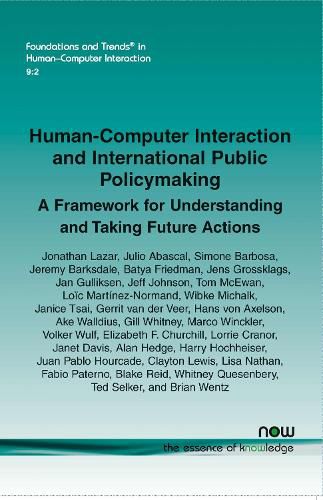Readings Newsletter
Become a Readings Member to make your shopping experience even easier.
Sign in or sign up for free!
You’re not far away from qualifying for FREE standard shipping within Australia
You’ve qualified for FREE standard shipping within Australia
The cart is loading…






This title is printed to order. This book may have been self-published. If so, we cannot guarantee the quality of the content. In the main most books will have gone through the editing process however some may not. We therefore suggest that you be aware of this before ordering this book. If in doubt check either the author or publisher’s details as we are unable to accept any returns unless they are faulty. Please contact us if you have any questions.
This monograph lays out a discussion framework for understanding the role of human-computer interaction (HCI) in public policymaking. It takes an international view, discussing potential areas for research and application and their potential for impact. The aim is to provide a solid foundation for discussion, cooperation and collaborative interaction, and to outline future programs of activity.
It starts with an introduction to HCI and public policy and goes on to discuss how HCI research and practices already inform public policy, providing representative examples. It then discusses how public policy influences HCI and provides representative public policy areas that are relevant to HCI, and where HCI could have even more impact in the future. It concludes by laying out a framework for involvement and suggested actions by the HCI community in public policy internationally.
This monograph summarizes the observations and recommendations from a daylong workshop at the CHI 2013 conference in Paris, France. The workshop invited the community’s perspectives regarding the intersection of governmental policies, international and domestic standards, recent HCI research discoveries, and emergent considerations and challenges. It also incorporates contributions made after the workshop by workshop participants and by individuals who were unable to participate in the workshop but whose work and interests were highly related and relevant.
$9.00 standard shipping within Australia
FREE standard shipping within Australia for orders over $100.00
Express & International shipping calculated at checkout
This title is printed to order. This book may have been self-published. If so, we cannot guarantee the quality of the content. In the main most books will have gone through the editing process however some may not. We therefore suggest that you be aware of this before ordering this book. If in doubt check either the author or publisher’s details as we are unable to accept any returns unless they are faulty. Please contact us if you have any questions.
This monograph lays out a discussion framework for understanding the role of human-computer interaction (HCI) in public policymaking. It takes an international view, discussing potential areas for research and application and their potential for impact. The aim is to provide a solid foundation for discussion, cooperation and collaborative interaction, and to outline future programs of activity.
It starts with an introduction to HCI and public policy and goes on to discuss how HCI research and practices already inform public policy, providing representative examples. It then discusses how public policy influences HCI and provides representative public policy areas that are relevant to HCI, and where HCI could have even more impact in the future. It concludes by laying out a framework for involvement and suggested actions by the HCI community in public policy internationally.
This monograph summarizes the observations and recommendations from a daylong workshop at the CHI 2013 conference in Paris, France. The workshop invited the community’s perspectives regarding the intersection of governmental policies, international and domestic standards, recent HCI research discoveries, and emergent considerations and challenges. It also incorporates contributions made after the workshop by workshop participants and by individuals who were unable to participate in the workshop but whose work and interests were highly related and relevant.